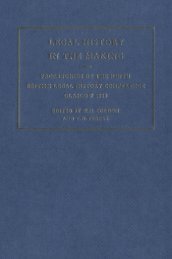130. - Collection Point® | The Total Digital Asset Management System
130. - Collection Point® | The Total Digital Asset Management System
130. - Collection Point® | The Total Digital Asset Management System
Create successful ePaper yourself
Turn your PDF publications into a flip-book with our unique Google optimized e-Paper software.
210 Structure and the Book ofZechariah<br />
something for the sheep and sends a shepherd, who at first does his job<br />
properly, and gets rid of certain bad leaders.<br />
For some reason—almost certainly to do with their lack of response<br />
to him—the shepherd leaves the sheep to their fate. Almost certainly,<br />
we are meant to assume that they are left in the hands of their leaders.<br />
<strong>The</strong> failure of the shepherd to bring about a change in the attitude<br />
and situation of the sheep leads to the breaking of the staffs DJU and<br />
D**?3n, which have something to do with a covenant Yahweh has made,<br />
and the brotherhood between Israel and Judah. Probably this signifies<br />
that there will be disunity between the two parts of Israel, and that<br />
they will be at the mercy of other peoples.<br />
We can not be sure of the significance of the thirty shekels, or their<br />
ending up with the potter 1 in the Temple. <strong>The</strong>y represent at least the<br />
low value placed by either the 'traffickers in the sheep' or the 'poor of<br />
the flock' on the services of God's shepherd.<br />
In 11.15-17, we find a new stage in the story. <strong>The</strong> prophet is commanded<br />
to become a shepherd again, but this time he is to be actively<br />
bad. For this he is himself to be punished. We are accustomed to reading<br />
that Yahweh uses evil instruments for his purposes (cf. Isa. 10.5-<br />
19; Hab. 1.5-6) or that he uses Cyrus, 'although he does not know'<br />
God (Isa. 45.5), to achieve what he wants. It is quite different to read<br />
that a prophet is commanded to do something evil. <strong>The</strong> closest parallel<br />
is probably the ironic speech of Micaiah in 1 Kgs 22.19-23, or<br />
Ezek. 20.25-26. <strong>The</strong> section ends with a totally bleak picture.<br />
In 13.7-9, as we have seen from the parallels, the position is taken<br />
up from where it was at the end of 11.17. Are we to assume that the<br />
sword is against him because he has not done his job properly? <strong>The</strong><br />
text does not say this; in fact the emphasis is on the relationship<br />
between Yahweh and the shepherd: this time *m definitely means 'my<br />
shepherd', and Tnar confirms it. A severe double refining process is<br />
described at the end of which the relationship between Yahweh and<br />
1. <strong>The</strong> reading iicvn *?K has occasioned difficulty. Syr. reads •UttRn, the<br />
treasury, and it is felt that this is more easily understandable, especially in the light of<br />
the nvr m before the second mention of the phrase. LXX, 'A, I, L and Matt. 27.10<br />
support MT, which should be accepted. <strong>The</strong>re is a difference of opinion as to whether<br />
this means 'potter' or 'founder'. C.C. Torrey (<strong>The</strong> Foundry of the Second Temple<br />
at Jerusalem', JBL 55 [1936], pp. 247-60) argued that the word refers to the official<br />
in charge of the foundry. Further see Rudolph, Haggai, pp. 202-203; Saeb0, 'Die<br />
deuterosacharjanische Frage', pp. 78-83.






